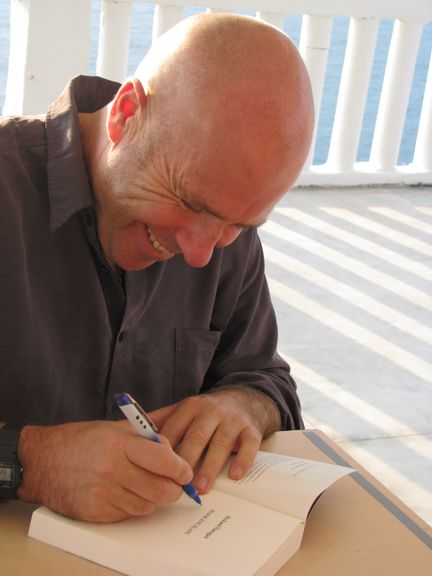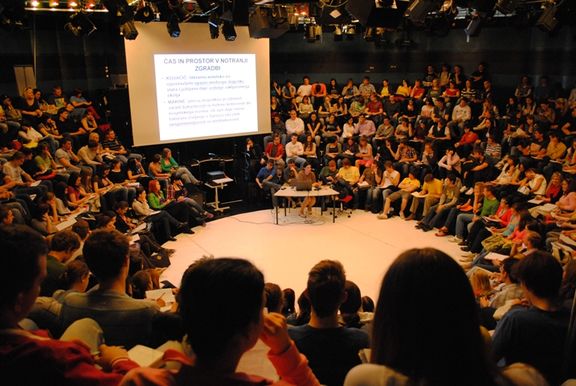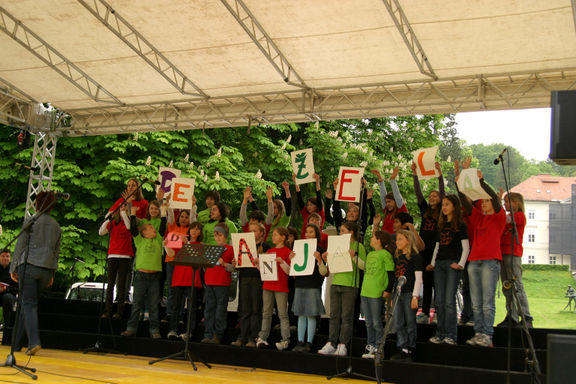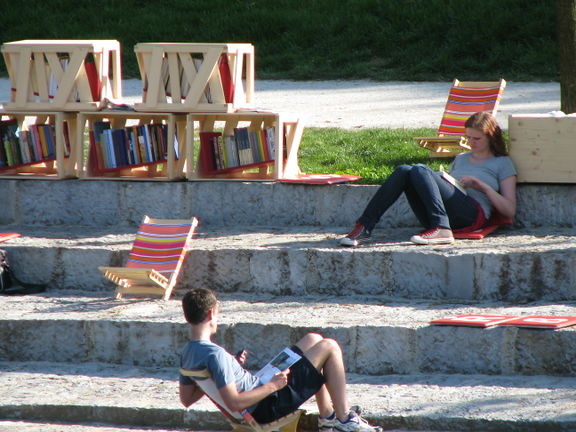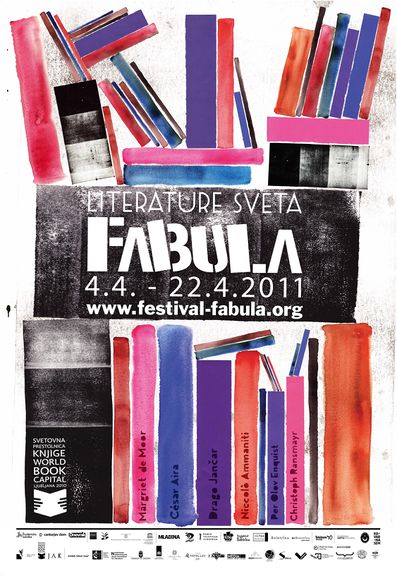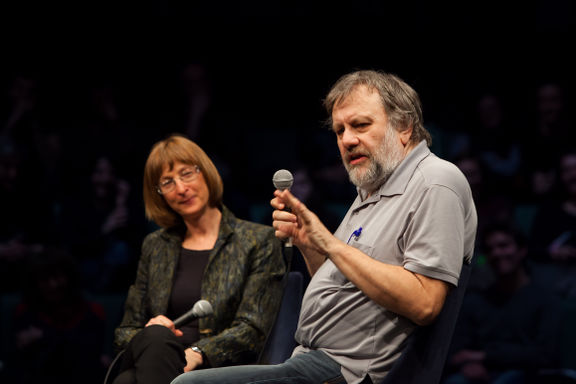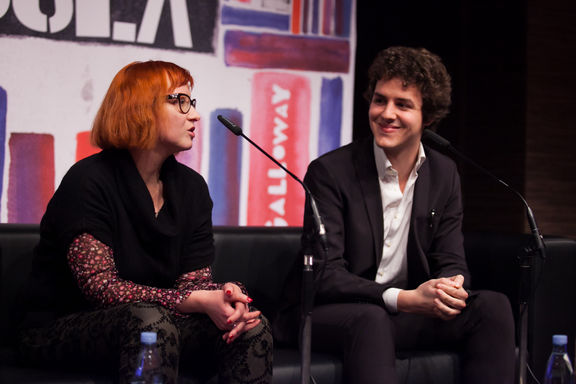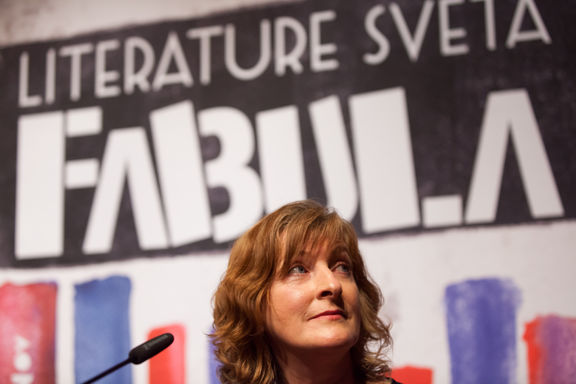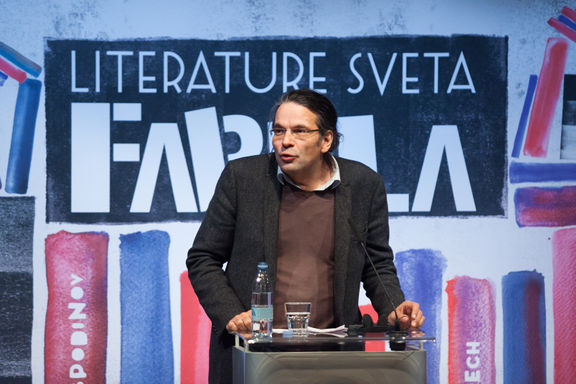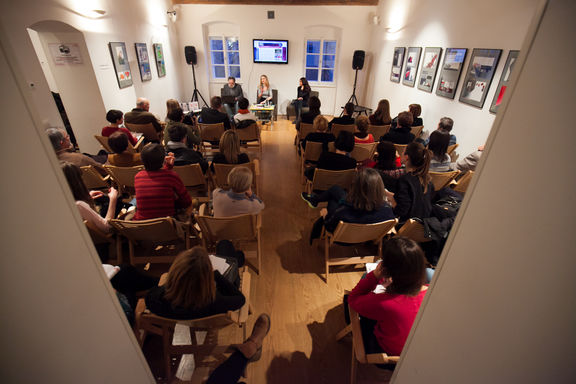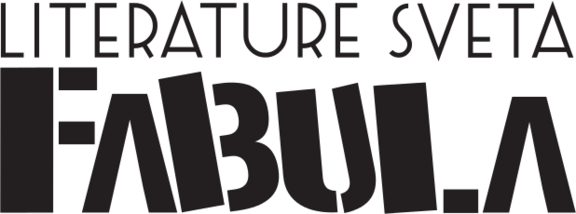|
|
| Line 43: |
Line 43: |
| | Founded in 2003, [[Fabula Festival]] has hosted many modern classics: Herta Müller, Irvin Welsh, Jonathan Franz, Hanif Kureishi, David Grossman, Janice Galloway, Richard Flanagan, Taiye Selasi, Tatiana Tolstoy, Eric Vuillard, Rachel Cusk, Deborah Levy, Jokha Alharthi, Bernhard Schlink, Vladimir Sorokin, Chimamanda Ngozi Adichie and many others. The festival’s concept has evolved and improved throughout the years and is now based on a curator’s pick of five authors, who are already considered literary classics or who have made a significant mark on world literature in recent years with their work. | | Founded in 2003, [[Fabula Festival]] has hosted many modern classics: Herta Müller, Irvin Welsh, Jonathan Franz, Hanif Kureishi, David Grossman, Janice Galloway, Richard Flanagan, Taiye Selasi, Tatiana Tolstoy, Eric Vuillard, Rachel Cusk, Deborah Levy, Jokha Alharthi, Bernhard Schlink, Vladimir Sorokin, Chimamanda Ngozi Adichie and many others. The festival’s concept has evolved and improved throughout the years and is now based on a curator’s pick of five authors, who are already considered literary classics or who have made a significant mark on world literature in recent years with their work. |
| | | | |
| − | == World Literatures Fabula Festivals == | + | == Accompanying Programme == |
| − | World Literatures Fabula Festivals over the years hosted many well-known writer’s and covered many pressing literary, political and philosophical issues. Fabula Festival is a unique celebration of the arts and libraries and their power to transform lives, here are some of festivals.
| + | In addition to the literary part, the festival also has a theoretical focus, which each year questions a new relevant social topic. So far, Slavoj Žižek, Terry Eagleton, Chantal Mouffe, Eva Illouz, Jean-Claude Milner, Patrick Boucheron, Umberto Galimberti, Chimamanda Ngozi Adichieand others have been guests in the theoretical focus. Fabula Festival is also distinguished by an extremely varied accompanying program, which is intended for all generations of readers and brings everything from children's and youth programs (Young Fabula), interactive literary installations to public space (Fabula polis), collaborations with Slovenian publishers and bookstores (Fabula selection), genre intertwining between literature and theater and other art genres (Fabula outside literature), to projects establishing the festival as an incubator of new literary ideas and future literary trends (Fabula Hub), thus strengthening the space of the wider literary and social community. |
| − | | |
| − | ''World Literatures - Fabula Festival 2010'' was one of the core events of the [[World Book Capital Ljubljana 2010]]. The festival hosted Herta Müller, David Grossman, Jonathan Franzen, Michal Viewegh, Daniel Kehlmann, and Richard Flanagan and presented the new translation of their works into Slovenian language. Screenings of the films based on the works by Fabula guests took place in [[Kinodvor Cinema]].
| |
| | | | |
| | {{Image|Fabula Festival 2010 Opening ceremony Photo Mojca Pisek.JPG}} | | {{Image|Fabula Festival 2010 Opening ceremony Photo Mojca Pisek.JPG}} |
| Line 53: |
Line 51: |
| | | | |
| | {{Image|Fabula Festival 2010 Preseren's Coat Photo Mojca Pisek.jpg}} | | {{Image|Fabula Festival 2010 Preseren's Coat Photo Mojca Pisek.jpg}} |
| − |
| |
| − | In 2011 the festival "World Literatures – Fabula 2011" hosted César Aira, Niccolò Ammaniti, Per Olov Enquist, Cristoph Ransmayr, [[Drago Jančar]], and Margriet de Moor. Again the festival presented a fabric of talks, books, and the related films, sounds, fairy tales, and images of the writers' countries. The topic of Islam was dealt with by connoisseurs from Slovenia, Bosnia-Herzegovina, and Turkey, the latter being the country in focus within ''The International Within the Local'', a poetry and translation project. The international symposium focused on [[Edvard Kocbek]], whose susceptibility to complexity and paradoxes of human psychological structure and social existence often made him a victim of the ideologically uniform times. The [[Fabula Award]] for the best Slovenian collection of short stories from the past two years was given to [[Lado Kralj]] for ''Kosec koso brusi'' (A Reaper Grinds His Scythe).
| |
| − |
| |
| − | The 9th Fabula Festival in 2012 hosted Hanif Kureishi (UK), Amitav Gosh (USA), Mikhail Shishkin (RU) and Leena Krohn (FI). On this occasion a book by each author was translated into Slovene and published along with a short story collection by five Slovene authors: [[Dušan Čater]], [[Mojca Kumerdej]], [[Andrej E. Skubic]], [[Suzana Tratnik]] and [[Goran Vojnović]]. Authors presented their work at 5 main literary events accompanied by 20 other events such as literary readings, round tables, symposia, children’s program and other events with guests from around the world. The [[Fabula Award]] for the best Slovenian collection of short stories from the past two years was given to [[Dušan Čater]] for his collection ''Džehenem'' (‘hell’ in Turkish).
| |
| − |
| |
| − | In 2013 the Fabula guests were Irvine Welsh (GB), Ilija Trojanow (BG), Eduardo Sanchez Rugeles (VE) and Dorota Masłowska (PL) along with Slovene authors: [[Stanka Hrastelj]], [[Milan Kleč]], [[Marko Sosič]] and [[Dušan Šarotar]], in 2014 the guests were Péter Esterházy, Juan Goytisolo, Jacqueline Raoul-Duval, Thomas Brussig, [[Gabriela Babnik]], [[Nejc Gazvoda]], [[Alojz Ihan]], [[Vesna Lemaić]] and [[Miha Mazzini]], who tackled the festival focus ''Faces of Freedom Revealed''. In March 2014 arrived a special guest, Michel Houellebecq, well-known to Slovene readers through the five translated novels.
| |
| − |
| |
| − | In 2016 edition of the Fabula hosts Matthias Göritz, Cees Nooteboom, Juan Gabriel Vásquez and Sjón, while Slovenian guest is illustrator and artist [[Samira Kentrić]] presenting her new graphic novel. The festival's topic was ''Newcomers'', a pressing issues being a subject of discussions with Igor Štiks, Peter Vermeersch, Jean-Claude Milner, [[Alenka Zupančič]], Srečko Horvat, Teofil Pančić, [[Ervin Hladnik Milharčič]] and [[Anica Mikuš Kos]].
| |
| − |
| |
| − | Fabula Festival 2019 focused on walls; at first glance with the fall of the Berlin Wall, which became historical event three decades ago, but also with many others kind of walls: walls between reality and fiction, past and present, walls between cultures, between the emotions of people who have difficulty communicating ... and last but not least also with real walls, brick and concrete, that characterize our architectural landscape. Sixteen edition of festival brought many important names of world literature to Ljubljana, such as Ingo Schulze, Éric Vuillard and Tatjana Tolstoj.
| |
| − |
| |
| | | | |
| | {{YouTube|Hf1VdeqcTV0}} | | {{YouTube|Hf1VdeqcTV0}} |
| − |
| |
| − |
| |
| − |
| |
| − | == Venues ==
| |
| − | The Fabula Festival takes place in several cities round Slovenia. The Fabula Festival of Stories in 2006, for example, was organised in Ljubljana, Maribor, Postojna, Izola, and Koper.
| |
| − |
| |
| − | The events of the 2010 festival took place in Ljubljana ([[Cankarjev dom, Cultural and Congress Centre|Cankarjev dom]], [[Kinodvor Cinema]], the [[City Museum of Ljubljana]], the [[Slovene Ethnographic Museum]], and [[Beletrina Bookshop]]); in Maribor ([[Center of Jewish Cultural Heritage Synagogue Maribor]]); Ptuj ([[Ivan Potrč Library Ptuj|Ivan Potrč Library]]); Ribnica ([[Mikl House Library]]); Koper ([[Mladinska knjiga Bookstores|Dom knjige Bookshop]]); and Trieste, Italy.
| |
| − |
| |
| − | The venues of the Fabula 2011 included also hospitals, homes for the elderly, and crisis centres, as well as urban streets in collaboration with an initiative of the homeless, the magazine ''The Kings of the Street'' [Kralji ulice].
| |
| − |
| |
| − | Recently the main part of the festival programme has been located in Ljubljana while the pre-festival events take place in Kranj, Koper, Celje, Novo mesto, Maribor and Trst/Trieste.
| |
| | | | |
| | == See also == | | == See also == |
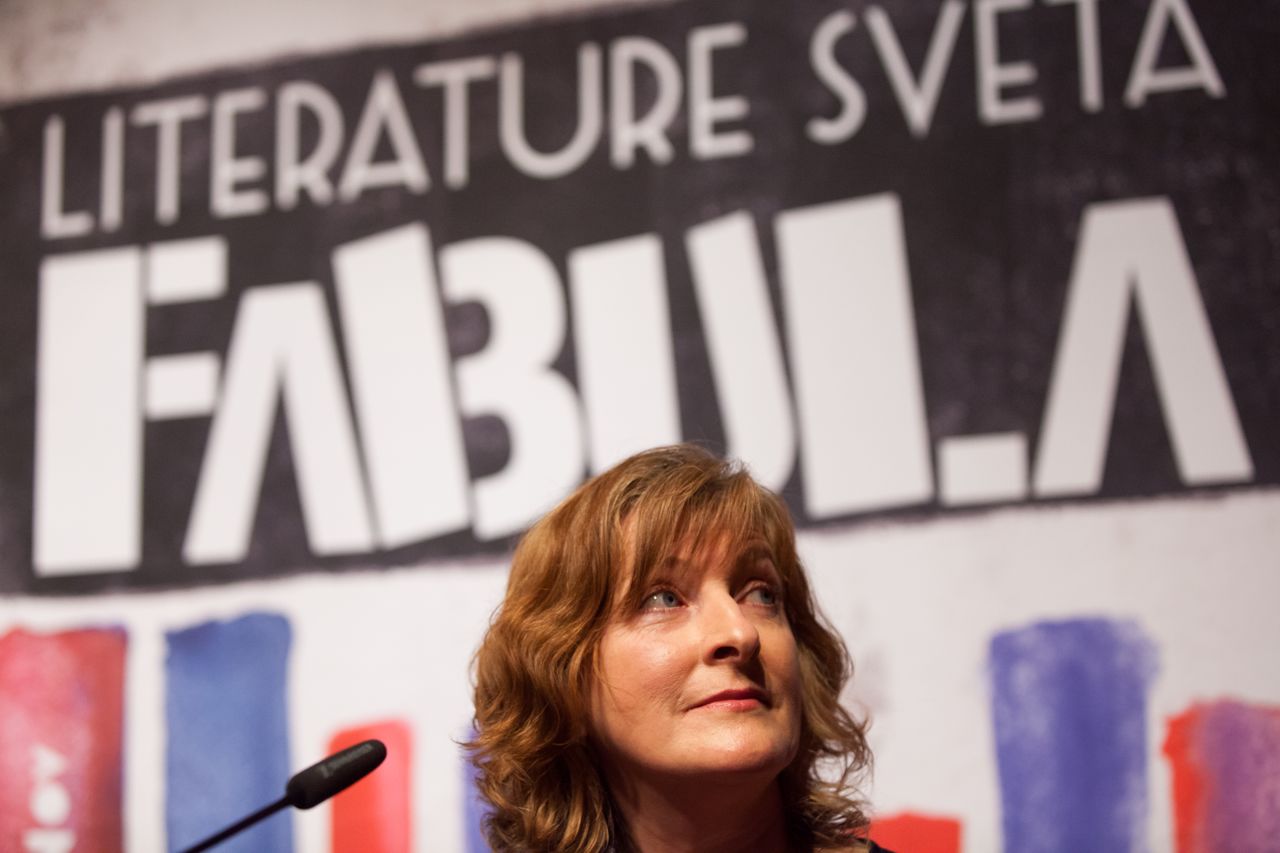 Janice Galloway, the Fabula opening ceremony guest. World Literatures - Fabula Festival, 2015
Janice Galloway, the Fabula opening ceremony guest. World Literatures - Fabula Festival, 2015
Fabula Festival ‒ Literature of the World is the biggest and most visited literary festival in Slovenia and the wider region. Produced by the Beletrina Publishing Institute in collaboration with Cankarjev dom, Cultural and Congress Centre the festival brings together world-class authors through well-considered curatorship. Each year, the festival aims to select five distinguished writers, while the Fabula Hub devotes attention to promising, up-and-coming authors. In addition to hosting renowned writers and establishing live contact between international literature and Slovenian audiences, translated works of the chosen five are also published as part of the festival. The festival also features a theoretical focus addressing a relevant social issue every year - raising topical socio-critical issues it addresses contemporary challenges.
Background
Founded in 2003, Fabula Festival has hosted many modern classics: Herta Müller, Irvin Welsh, Jonathan Franz, Hanif Kureishi, David Grossman, Janice Galloway, Richard Flanagan, Taiye Selasi, Tatiana Tolstoy, Eric Vuillard, Rachel Cusk, Deborah Levy, Jokha Alharthi, Bernhard Schlink, Vladimir Sorokin, Chimamanda Ngozi Adichie and many others. The festival’s concept has evolved and improved throughout the years and is now based on a curator’s pick of five authors, who are already considered literary classics or who have made a significant mark on world literature in recent years with their work.
Accompanying Programme
In addition to the literary part, the festival also has a theoretical focus, which each year questions a new relevant social topic. So far, Slavoj Žižek, Terry Eagleton, Chantal Mouffe, Eva Illouz, Jean-Claude Milner, Patrick Boucheron, Umberto Galimberti, Chimamanda Ngozi Adichieand others have been guests in the theoretical focus. Fabula Festival is also distinguished by an extremely varied accompanying program, which is intended for all generations of readers and brings everything from children's and youth programs (Young Fabula), interactive literary installations to public space (Fabula polis), collaborations with Slovenian publishers and bookstores (Fabula selection), genre intertwining between literature and theater and other art genres (Fabula outside literature), to projects establishing the festival as an incubator of new literary ideas and future literary trends (Fabula Hub), thus strengthening the space of the wider literary and social community.
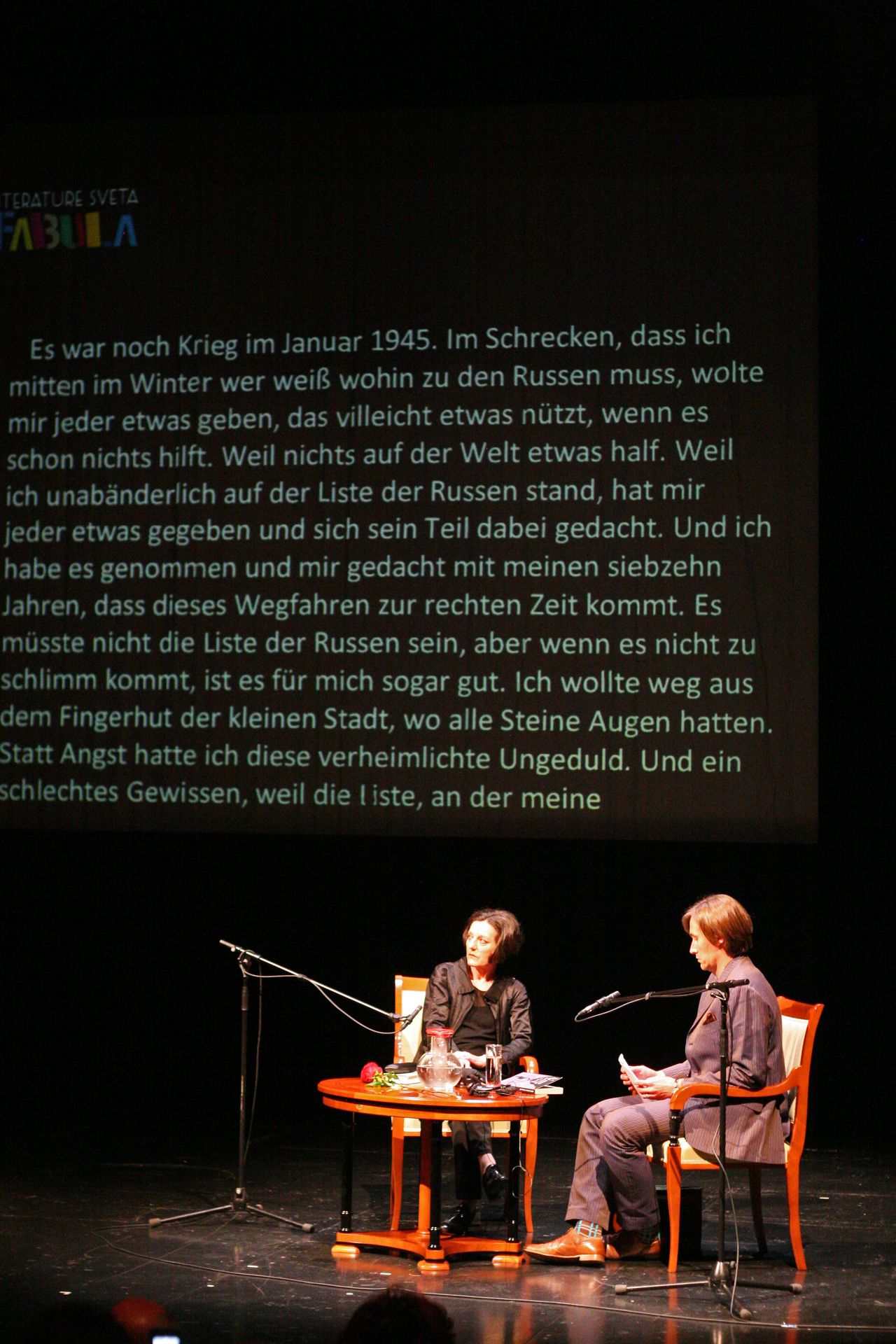 Herta Müller, 2009 Nobel Laureate is honoured guest at the opening ceremony of the festival World Literatures - Fabula Festival, Slovene National Theatre Drama Ljubljana in 2010
Herta Müller, 2009 Nobel Laureate is honoured guest at the opening ceremony of the festival World Literatures - Fabula Festival, Slovene National Theatre Drama Ljubljana in 2010
The festival programme brought the book and literature into the streets and squares of the city: the promenade at Breg Street in the old city centre turned into the authors' cities: the words, music, film and smells depicted the cultures of New York, Jerusalem, Prague, Vienna, and Sydney. Music concerts featured the Chili dogs, Keel Klezmer Band, Godalika, Saxophone quartet 4saxess, AHIMSAUrban band, as well as a huge choir event: eighteen Slovene choirs accompanied by the Philharmonics orchestra sang works by Slovene poets. Secondary school students wrote down Prešeren's epic Krst pri Savici [Baptism at the Savica] on the Ljubljana promenade in free typographic forms, accompanied by the rap authors Boštjan Gorenc - Pižama and Klemen Klemen.
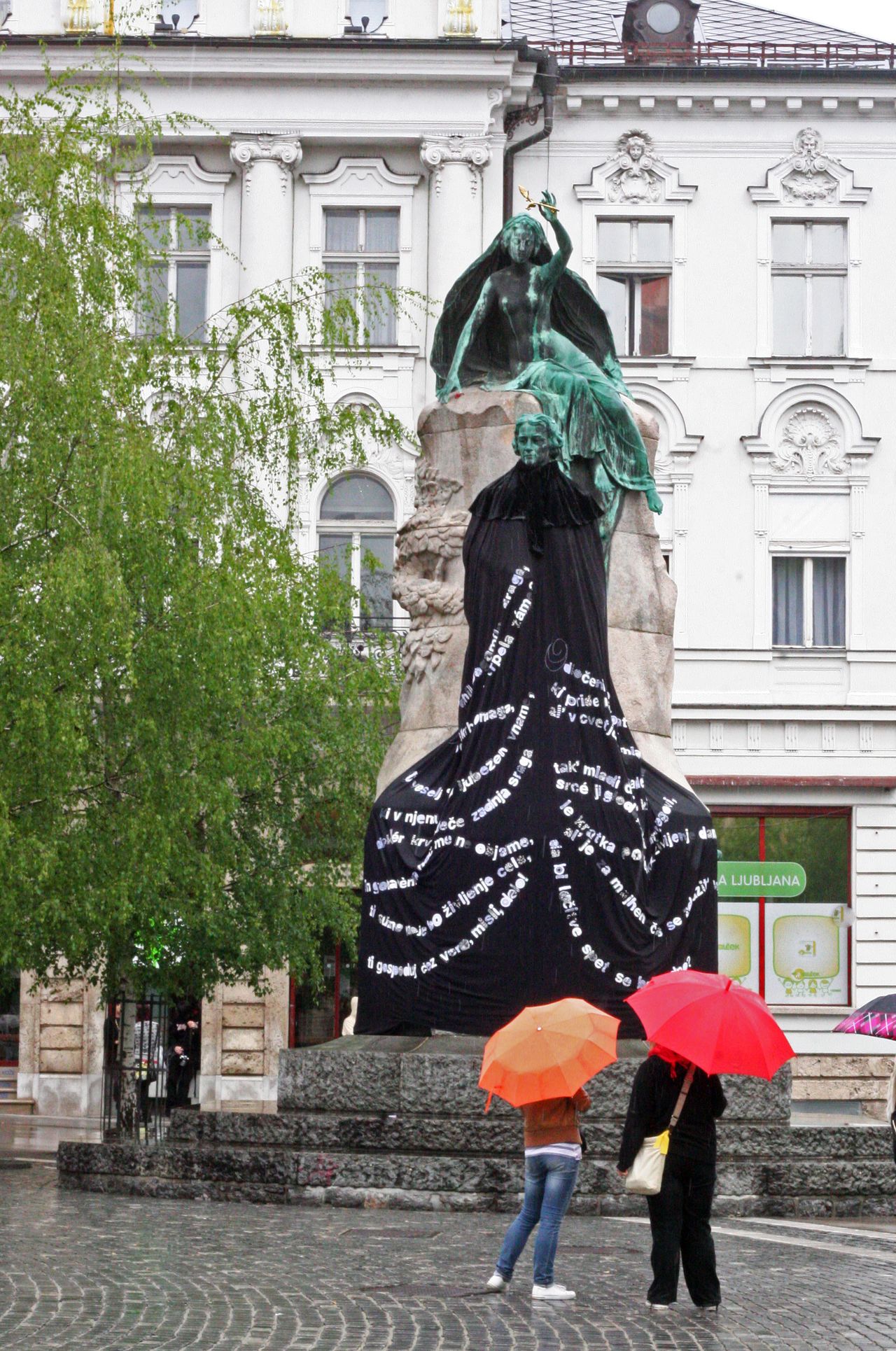 Prešeren's Coat, by Andreja Brulc, art installation using passages from the poet's longest poem Krst pri Savici[Baptism at Savica] on a new robe dressing Prešeren's monument, World Literatures - Fabula Festival, 2010
Prešeren's Coat, by Andreja Brulc, art installation using passages from the poet's longest poem Krst pri Savici[Baptism at Savica] on a new robe dressing Prešeren's monument, World Literatures - Fabula Festival, 2010
See also
External links
Gallery
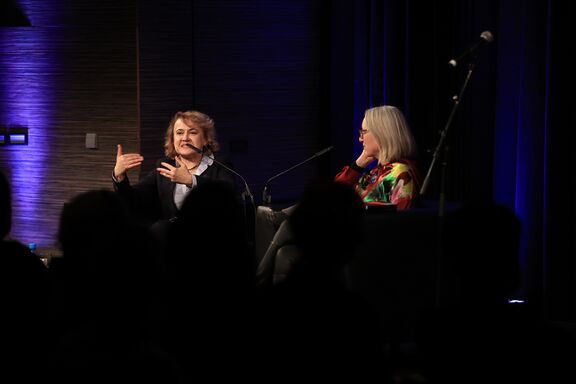
Opening event of Fabula Festival 2023 hosted the Ukrainian writer Oksana Zabužko, author of the novel Field Research of Ukrainian Sex, that was interpreted by drama actor Mario Dragojević. The conversation with the author was led by Ksenija Horvat.
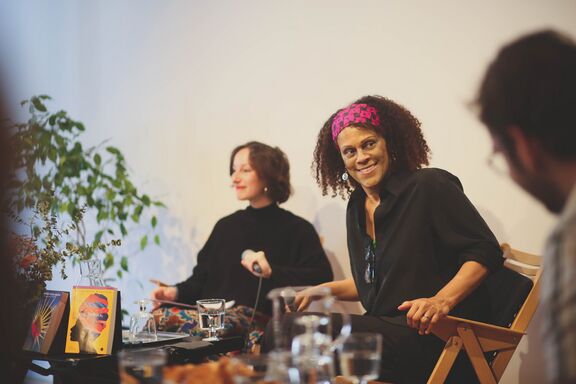
The award-winning British writer, academic and long-time fighter for greater inclusivity in literature Bernardine Evaristo joined the 2023 edition of the festival at the so-called Itn's literary breakfast (hosted by Fabula Festival and Itn.). Photo: Nina Pernat
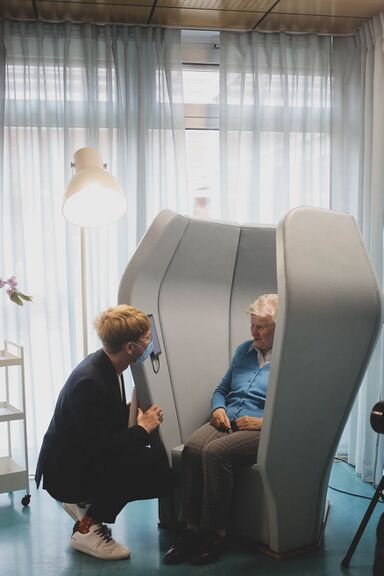
The artistic director of the festival Aljaž Koprivnikar at the home of the senior citizens DSO Fužine where he presented FabulaFotelj, special project of the 2022 edition of the festival, an interactive and movable armchair, equipped with audio books that was created together with prostoRož.
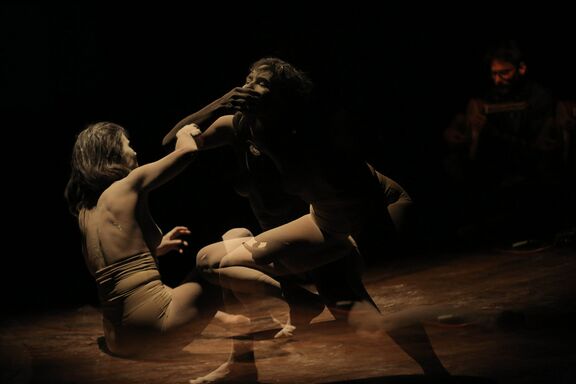
The virtual Q&A between Mieko Kawakami and Nagisa Moritoki Škof that was accompanied by a butoh performance by Darinka Pillari took place at the Cankarjev dom Club in 2022. It presented Summer Stories, the latest novel by Japanese author Mieko Kawakami - a portrait of contemporary womanhood in Japan.
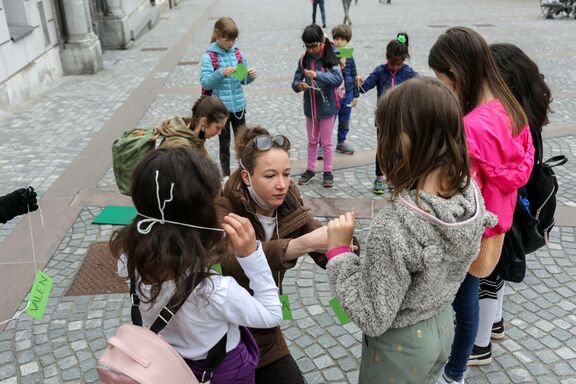
Under the guidance of mentors (Anja Koželj, Anja Koželj, Petra Stanišič), the children went on a literary treasure hunt, which took them to museums, libraries and bookstores, where they were given hints to continue the hunt. The event was part of the Young Fabula at the 2021 edition of the festival. Photo: Jaka Gaser
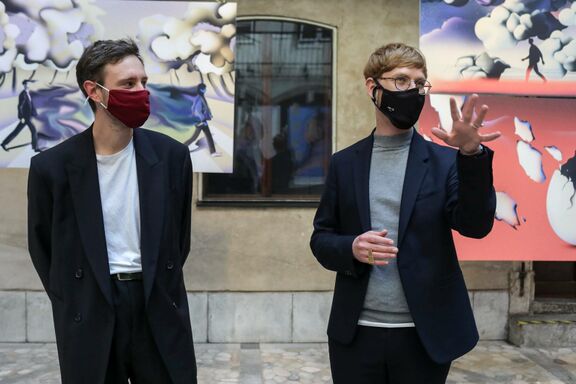
The Fabula book collection of 2021 lives through the illustrations of the designer and illustrator, Jure Brglez aka Brglesita, which were presented at the exhibition at the City Hall Atria in Ljubljana. Artist is accompanied by the artistic director of the festival Aljaž Koprivnikar. Photo: Jaka Gaser
![Niccolò Ammaniti's Jaz in ti [You and Me] book cover, 2010](/images/thumb/7/74/Fabula_Festival_-_11.jpg/455px-Fabula_Festival_-_11.jpg)
Niccolò Ammaniti's Jaz in ti [You and Me] book cover, 2010
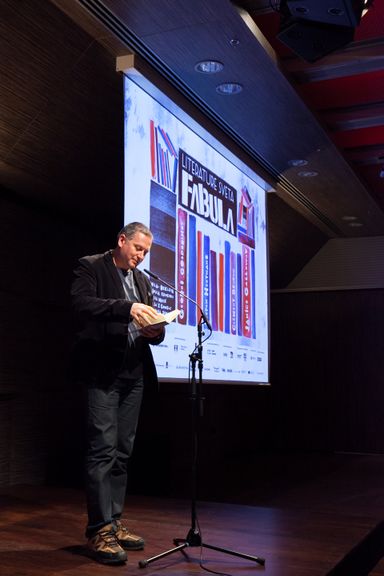
Georgi Gospodinov, a Bulgarian poet, writer, and playwright, was a guest at the World Literatures - Fabula Festival in 2015. His novel The Physics of Sorrow, which was awarded the Bulgarian Novel of the Year prize was translated into Slovenian in 2015.
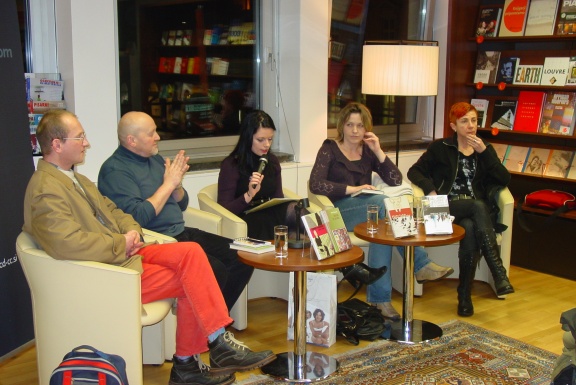
Vili Rezman (second from the left) presenting his awarded work in Konzorcij, at Mladinska knjiga Bookstores during Fabula Festival of Stories, 2009

 Prešeren's Coat, by Andreja Brulc, art installation using passages from the poet's longest poem Krst pri Savici[Baptism at Savica] on a new robe dressing Prešeren's monument, World Literatures - Fabula Festival, 2010
Prešeren's Coat, by Andreja Brulc, art installation using passages from the poet's longest poem Krst pri Savici[Baptism at Savica] on a new robe dressing Prešeren's monument, World Literatures - Fabula Festival, 2010











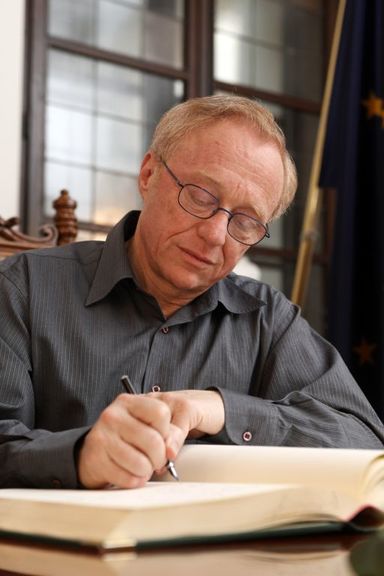
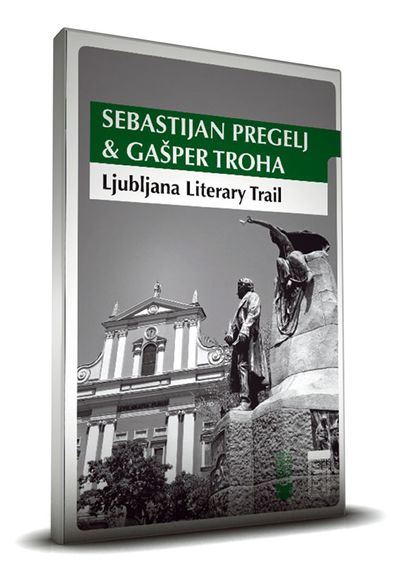
![Niccolò Ammaniti's Jaz in ti [You and Me] book cover, 2010](/images/thumb/7/74/Fabula_Festival_-_11.jpg/455px-Fabula_Festival_-_11.jpg)
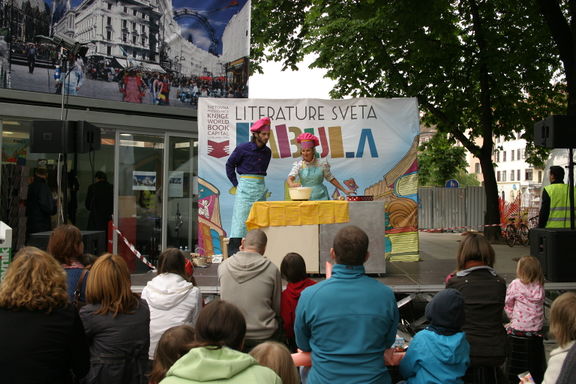
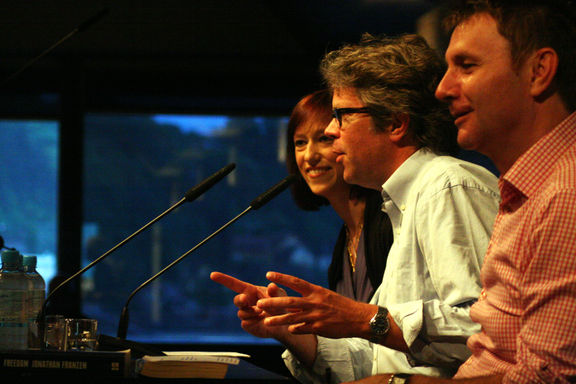
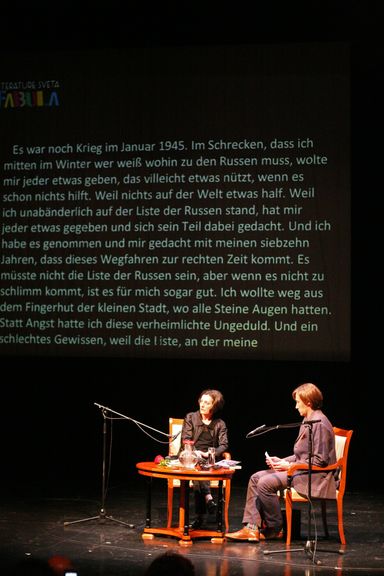
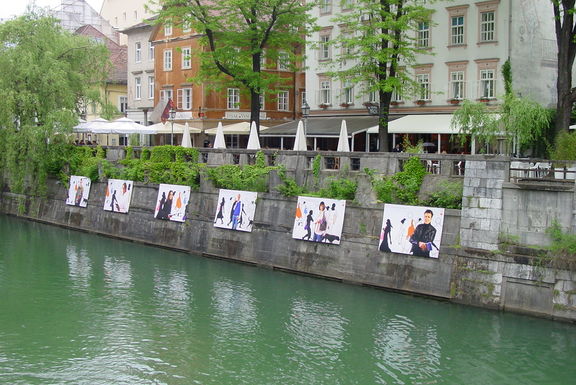
![Prešeren's Coat, by Andreja Brulc, art installation using passages from the poet's longest poem Krst pri Savici[Baptism at Savica] on a new robe dressing Prešeren's monument, World Literatures - Fabula Festival, 2010](/images/thumb/6/64/Fabula_Festival_2010_Preseren%27s_Coat_Photo_Mojca_Pisek.jpg/382px-Fabula_Festival_2010_Preseren%27s_Coat_Photo_Mojca_Pisek.jpg)
